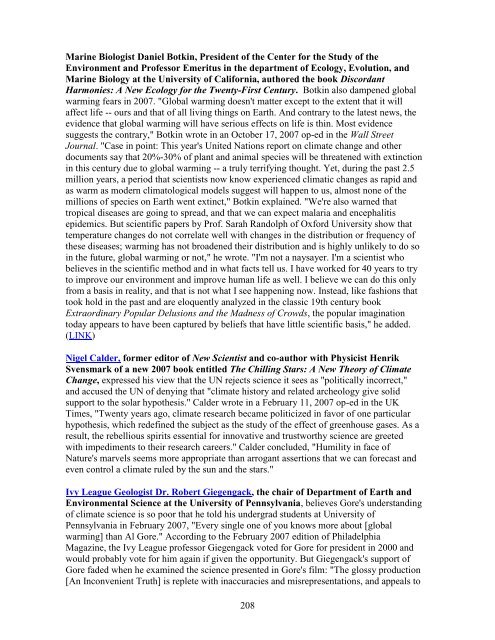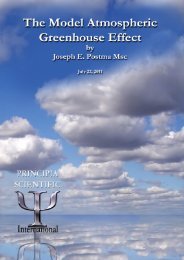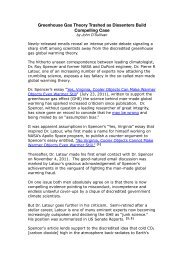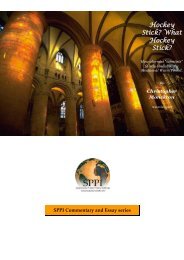Than 1000 International Scientists Dissent Over Man-Made Global ...
Than 1000 International Scientists Dissent Over Man-Made Global ...
Than 1000 International Scientists Dissent Over Man-Made Global ...
Create successful ePaper yourself
Turn your PDF publications into a flip-book with our unique Google optimized e-Paper software.
Marine Biologist Daniel Botkin, President of the Center for the Study of the<br />
Environment and Professor Emeritus in the department of Ecology, Evolution, and<br />
Marine Biology at the University of California, authored the book Discordant<br />
Harmonies: A New Ecology for the Twenty-First Century. Botkin also dampened global<br />
warming fears in 2007. "<strong>Global</strong> warming doesn't matter except to the extent that it will<br />
affect life -- ours and that of all living things on Earth. And contrary to the latest news, the<br />
evidence that global warming will have serious effects on life is thin. Most evidence<br />
suggests the contrary," Botkin wrote in an October 17, 2007 op-ed in the Wall Street<br />
Journal. "Case in point: This year's United Nations report on climate change and other<br />
documents say that 20%-30% of plant and animal species will be threatened with extinction<br />
in this century due to global warming -- a truly terrifying thought. Yet, during the past 2.5<br />
million years, a period that scientists now know experienced climatic changes as rapid and<br />
as warm as modern climatological models suggest will happen to us, almost none of the<br />
millions of species on Earth went extinct," Botkin explained. "We're also warned that<br />
tropical diseases are going to spread, and that we can expect malaria and encephalitis<br />
epidemics. But scientific papers by Prof. Sarah Randolph of Oxford University show that<br />
temperature changes do not correlate well with changes in the distribution or frequency of<br />
these diseases; warming has not broadened their distribution and is highly unlikely to do so<br />
in the future, global warming or not," he wrote. "I'm not a naysayer. I'm a scientist who<br />
believes in the scientific method and in what facts tell us. I have worked for 40 years to try<br />
to improve our environment and improve human life as well. I believe we can do this only<br />
from a basis in reality, and that is not what I see happening now. Instead, like fashions that<br />
took hold in the past and are eloquently analyzed in the classic 19th century book<br />
Extraordinary Popular Delusions and the Madness of Crowds, the popular imagination<br />
today appears to have been captured by beliefs that have little scientific basis," he added.<br />
(LINK)<br />
Nigel Calder, former editor of New Scientist and co-author with Physicist Henrik<br />
Svensmark of a new 2007 book entitled The Chilling Stars: A New Theory of Climate<br />
Change, expressed his view that the UN rejects science it sees as "politically incorrect,"<br />
and accused the UN of denying that "climate history and related archeology give solid<br />
support to the solar hypothesis." Calder wrote in a February 11, 2007 op-ed in the UK<br />
Times, "Twenty years ago, climate research became politicized in favor of one particular<br />
hypothesis, which redefined the subject as the study of the effect of greenhouse gases. As a<br />
result, the rebellious spirits essential for innovative and trustworthy science are greeted<br />
with impediments to their research careers." Calder concluded, "Humility in face of<br />
Nature's marvels seems more appropriate than arrogant assertions that we can forecast and<br />
even control a climate ruled by the sun and the stars."<br />
Ivy League Geologist Dr. Robert Giegengack, the chair of Department of Earth and<br />
Environmental Science at the University of Pennsylvania, believes Gore's understanding<br />
of climate science is so poor that he told his undergrad students at University of<br />
Pennsylvania in February 2007, "Every single one of you knows more about [global<br />
warming] than Al Gore." According to the February 2007 edition of Philadelphia<br />
Magazine, the Ivy League professor Giegengack voted for Gore for president in 2000 and<br />
would probably vote for him again if given the opportunity. But Giegengack's support of<br />
Gore faded when he examined the science presented in Gore's film: "The glossy production<br />
[An Inconvenient Truth] is replete with inaccuracies and misrepresentations, and appeals to<br />
208





